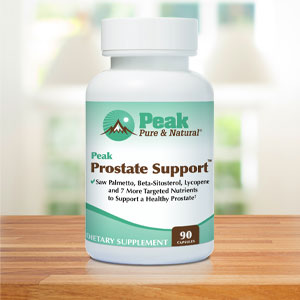Get Easy Health Digest™ in your inbox and don’t miss a thing when you subscribe today. Plus, get the free bonus report, Mother Nature’s Tips, Tricks and Remedies for Cholesterol, Blood Pressure & Blood Sugar as my way of saying welcome to the community!
Androgen deprivation therapy raises Alzheimer’s and dementia risk

Prostate cancer is one of the most common types of cancer in men, a fact that doesn’t make the disease any less frightening.
This is especially true since some forms of the cancer are extremely aggressive and require aggressive levels of treatment to match. This treatment can include radiation, chemotherapy, surgery and hormone therapy.
Now, researchers at the University of Pennsylvania have made a troubling discovery: That hormone therapy (also known as androgen deprivation therapy) has been linked to Alzheimer’s and dementia.
What is androgen deprivation therapy?
Androgen deprivation therapy is a hormone-suppressing therapy used to treat prostate cancer.
Basically, men with prostate cancer are given drugs that suppress levels of their male hormones, known as androgens. The main hormones the therapy focuses on are testosterone and dihydrotestosterone (DHT).
These androgens cause prostate cells to grow, including cancer cells, so by suppressing them, the therapy stops the hormones from affecting and stimulating cancer growth. So, with androgen therapy, prostate tumors may shrink. However, hormone therapy alone won’t cure the cancer which is why it’s used in combination with chemo and radiation.
Unfortunately, androgen deprivation therapy has always come with risks. These risks include sexual dysfunction such as loss of libido and erectile dysfunction.
Loss of bone mineral density, osteoporosis, and bone fractures are also common. In fact, studies have found that up to 20 percent of men experience a skeletal fracture within five years of starting androgen deprivation therapy.
Now, those aren’t the only risks men need to be aware of…
Dementia diagnoses in older men with prostate cancer
The University of Pennsylvania research team used the health data from more than 154,000 older men diagnosed with prostate cancer to analyze the association between androgen deprivation therapy and the subsequent diagnosis of Alzheimer’s disease or dementia.
Of the men, 62,330 (with an average age 76) received androgen deprivation therapy within two years of being diagnosed with prostate cancer and 91,759 men (with an average age 74) didn’t have such treatment. So, these two groups were closely matched in age at the time that they received their prostate cancer diagnosis. The difference was whether or not they received the hormone-suppressing therapy.
And, the researchers found that androgen deprivation therapy was associated with a higher likelihood of being diagnosed with Alzheimer disease or dementia compared with no androgen deprivation therapy over an average follow-up of eight years.
In other words, for many of the patients, their lives were being saved at the sacrifice of their memories.
The choice between cancer and dementia
One in nine men will be diagnosed with prostate cancer during his lifetime. This means many men will face a particularly difficult choice between cancer treatment and the possibility of Alzheimer’s or dementia.
Related: 12 natural prostate cancer killers
So, here’s what you should know…
Androgen deprivation therapy is more likely to be recommended if:
- The cancer has spread beyond the ability of chemo and radiation to handle alone
- If the disease returns following chemo or radiation
- If you’re at high risk of recurrence
- Prior to radiation to shrink the tumor
To reduce your risk of prostate cancer and the possible androgen therapy that comes with it, you can:
- Go low fat – Fats have been linked to a higher risk of prostate cancer, so choose low-fat dairy options, leaner cuts of meat, and use less oil in your cooking.
- Boost fruit and veggie intake – The vitamins and nutrients in fruits and vegetables may positively impact your prostate cancer risk so try to add an additional serving to each meal.
- Exercise – Exercise is just as healthy for your prostate as it is for the rest of your body. Get out there, get moving, and shoot for 30 minutes of physical activity on a daily basis.
- Lose weight – A BMI (body mass index) of 30 or above is associated with a higher prostate cancer risk. This means that slimming down can help you avoid that dangerous diagnosis.
The only sure way to avoid androgen deprivation therapy and the possible Alzheimer’s and dementia it can cause is to avoid prostate cancer. So, start taking steps now to boost your prostate health and talk to your doctor about your risk factors.
Editor’s note: Discover how to live a cancer prevention lifestyle — using foods, vitamins, minerals and herbs — as well as little-known therapies allowed in other countries but denied to you by American mainstream medicine. Click here to discover Surviving Cancer! A Comprehensive Guide to Understanding the Causes, Treatments and Big Business Behind Medicine’s Most Frightening Diagnosis!
Sources:
- Prostate cancer — Mayo Clinic
- Hormone Therapy for Prostate Cancer — American Cancer Society
- Side effects of androgen deprivation therapy — UpToDate
- Androgen deprivation therapy associated with risk of Alzheimer’s, dementia diagnoses in older men with prostate cancer — EurekAlert!
- Key Statistics for Prostate Cancer &mdashl American Cancer Society
- Prostate cancer prevention: Ways to reduce your risk — Mayo Clinic













